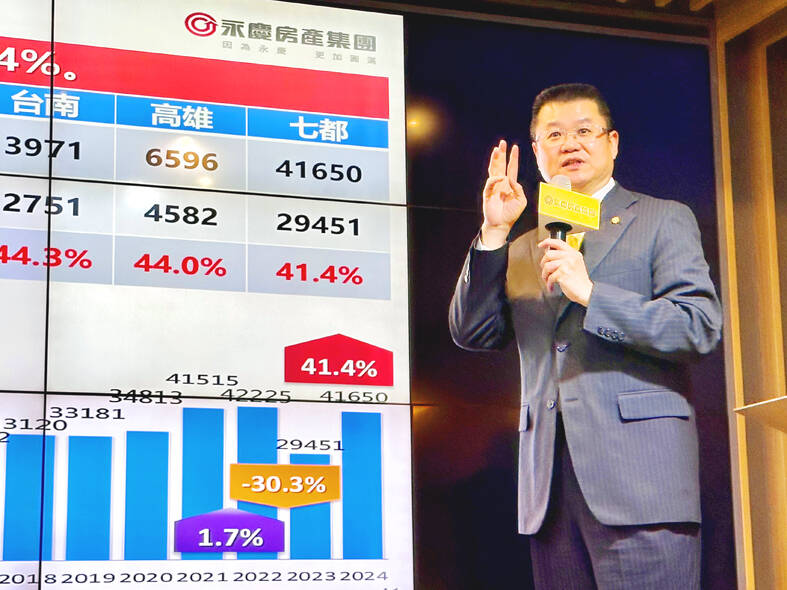House prices could climb higher next quarter on improved buying interest induced by the government’s continued interest subsidy for first-home purchases, a survey by Evertrust Rehouse Co (永慶房屋) showed yesterday.
Fifty-two percent of respondents expect house prices to pick up during the second quarter of the year, a finding that is 12 percentage points higher than three months earlier, the largest real-estate broker by number of offices told a news conference in Taipei.
The uptrend would come on top of an average 46.1 percent hike since the first quarter of 2020 when Evertrust teamed up with National Chengchi University to track real house price changes, Evertrust general manager Yeh Ling-chi (葉凌棋) said.

Photo: Hsu Yi-ping, Taipei Times
Yesterday marked the first time the university and Evertrust released their real house price index, which panel members said better captures housing market price movements than the government’s real price transaction platform.
Only 15 percent of respondents are expecting price corrections, as Taiwan is coming out of an economic slowdown, giving people less grounds for being pessimistic, Evertrust research manager Daniel Chen (陳賜傑) said.
Transaction data so far lent support to the positive views.
Housing transactions could total 81,000 to 85,000 units this quarter, suggesting a spike of up to 32 percent year-on-year, Chen said, adding that the government’s interest subsidy for first-home purchases has played a role in facilitating deals.
Exactly 50 percent of respondents said it is wise to buy a house this year, while 46 percent think it is time to sell, with house prices unlikely to boom or bust, Evertrust said.
House prices have soared more than 50 percent in major cities except Taipei, limiting the room for further growth, it said, adding that credit controls would also rein in prices.
However, rising land and building material prices mean that developers would likely not make price concessions, Evertrust said.
In the first half of this year, there could be 169,000 to 174,000 transactions, an increase of 22 to 25 percent, it said.
The property market would receive support from the favorable wealth effect linked to the TAIEX remaining above 20,000 points, while seeking to digest the central bank’s unexpected interest rate hike of 0.125 percentage points, it said.
The rate hike would not affect first-home purchases as the Ministry of Finance has expressed a willingness to absorb the extra borrowing costs, it added.

MULTIFACETED: A task force has analyzed possible scenarios and created responses to assist domestic industries in dealing with US tariffs, the economics minister said The Executive Yuan is tomorrow to announce countermeasures to US President Donald Trump’s planned reciprocal tariffs, although the details of the plan would not be made public until Monday next week, Minister of Economic Affairs J.W. Kuo (郭智輝) said yesterday. The Cabinet established an economic and trade task force in November last year to deal with US trade and tariff related issues, Kuo told reporters outside the legislature in Taipei. The task force has been analyzing and evaluating all kinds of scenarios to identify suitable responses and determine how best to assist domestic industries in managing the effects of Trump’s tariffs, he

TIGHT-LIPPED: UMC said it had no merger plans at the moment, after Nikkei Asia reported that the firm and GlobalFoundries were considering restarting merger talks United Microelectronics Corp (UMC, 聯電), the world’s No. 4 contract chipmaker, yesterday launched a new US$5 billion 12-inch chip factory in Singapore as part of its latest effort to diversify its manufacturing footprint amid growing geopolitical risks. The new factory, adjacent to UMC’s existing Singapore fab in the Pasir Res Wafer Fab Park, is scheduled to enter volume production next year, utilizing mature 22-nanometer and 28-nanometer process technologies, UMC said in a statement. The company plans to invest US$5 billion during the first phase of the new fab, which would have an installed capacity of 30,000 12-inch wafers per month, it said. The

Taiwan’s official purchasing managers’ index (PMI) last month rose 0.2 percentage points to 54.2, in a second consecutive month of expansion, thanks to front-loading demand intended to avoid potential US tariff hikes, the Chung-Hua Institution for Economic Research (CIER, 中華經濟研究院) said yesterday. While short-term demand appeared robust, uncertainties rose due to US President Donald Trump’s unpredictable trade policy, CIER president Lien Hsien-ming (連賢明) told a news conference in Taipei. Taiwan’s economy this year would be characterized by high-level fluctuations and the volatility would be wilder than most expect, Lien said Demand for electronics, particularly semiconductors, continues to benefit from US technology giants’ effort

‘SWASTICAR’: Tesla CEO Elon Musk’s close association with Donald Trump has prompted opponents to brand him a ‘Nazi’ and resulted in a dramatic drop in sales Demonstrators descended on Tesla Inc dealerships across the US, and in Europe and Canada on Saturday to protest company chief Elon Musk, who has amassed extraordinary power as a top adviser to US President Donald Trump. Waving signs with messages such as “Musk is stealing our money” and “Reclaim our country,” the protests largely took place peacefully following fiery episodes of vandalism on Tesla vehicles, dealerships and other facilities in recent weeks that US officials have denounced as terrorism. Hundreds rallied on Saturday outside the Tesla dealership in Manhattan. Some blasted Musk, the world’s richest man, while others demanded the shuttering of his